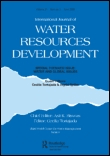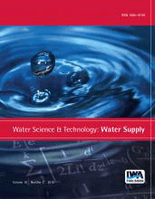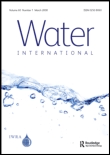
INTERNATIONAL JOURNAL OF WATER RESOURCES DEVELOPMENT
Scope & Guideline
Exploring innovative research in water resource management.
Introduction
Aims and Scopes
- Water Governance and Policy:
The journal extensively covers frameworks, strategies, and policies related to water governance, exploring how different governance models impact water management practices and sustainability. - Climate Change and Water Resources:
Research on the effects of climate change on water resources, including adaptation strategies, is a central theme, emphasizing the need for resilience in water management practices. - Water and Agricultural Management:
The intersection of water management and agricultural practices is a key focus, examining how water usage impacts food security and agricultural sustainability. - Transboundary Water Management:
The journal provides insights into the complexities of transboundary water governance, addressing conflicts and cooperation among nations sharing water resources. - Technological Innovations in Water Management:
Innovative technologies for water management, including desalination, water recycling, and smart irrigation systems, are frequently discussed, highlighting their role in enhancing water security. - Social Dimensions of Water Management:
The journal also addresses the social implications of water governance, including issues of equity, justice, and community participation in water management. - Water Quality and Pollution Management:
Research on maintaining water quality and managing pollution sources is critical, focusing on sustainable practices to protect water resources.
Trending and Emerging
- Integrated Water-Energy-Food Nexus:
There is a growing emphasis on the interconnectedness of water, energy, and food security, reflecting the need for holistic approaches to resource management that address multiple sectors simultaneously. - Climate Resilience and Adaptation Strategies:
Research focusing on strategies for enhancing resilience to climate change impacts on water resources is increasingly prominent, underscoring the urgency of adapting to changing environmental conditions. - Community Engagement and Participatory Governance:
Emerging studies highlight the importance of community involvement in water governance, emphasizing participatory approaches that empower local stakeholders and foster collaboration. - Water Equity and Justice:
There is a rising focus on issues of equity and justice in water access and management, reflecting global movements advocating for the rights of marginalized communities in water governance. - Technological Solutions for Water Scarcity:
Innovations aimed at addressing water scarcity, such as advanced desalination techniques and smart irrigation technologies, are becoming more central to discussions in the journal. - Impact of Global Events on Water Management:
The influence of global events, such as the COVID-19 pandemic, on water governance and management practices is an emerging theme, showcasing the need for adaptive strategies in crisis situations.
Declining or Waning
- Traditional Irrigation Practices:
Research on conventional irrigation methods appears to be declining as the focus shifts towards innovative and sustainable practices that better address current environmental challenges. - Hydropower Development:
Although hydropower remains a significant topic, there is a noticeable reduction in studies focusing solely on hydropower development, as the discussion has expanded to include integrated approaches that consider environmental impacts and community rights. - Water Rights Conflicts:
While still relevant, the frequency of papers specifically addressing water rights conflicts is decreasing, possibly reflecting a broader trend towards cooperative governance models rather than adversarial approaches. - Historical Water Management Practices:
There is a waning interest in historical analyses of water management practices, as contemporary issues and future-oriented research gain more traction in the journal's publications.
Similar Journals

Water Resources
Fostering scholarly dialogue on critical water issues.Water Resources, a prominent journal published by MAIK NAUKA/INTERPERIODICA/SPRINGER, focuses on the critical and evolving field of water science and technology. Established in 1976 and with a long-standing commitment to advancing knowledge, this journal explores interdisciplinary research that addresses the challenges surrounding water resource management, quality, and sustainability. With an impact factor positioned within the Q3 category of its field, it holds a notable Scopus rank (#181/261) in Environmental Science, emphasizing its role in driving scholarly discourse. While currently not open access, Water Resources provides vital insights for researchers, professionals, and students, making it an essential resource for those seeking to innovate and implement effective water management solutions. To stay ahead in a domain that is increasingly paramount to global sustainability efforts, consider engaging with the latest research published in this vital journal.

Water Conservation Science and Engineering
Fostering Collaboration for a Sustainable Water FutureWater Conservation Science and Engineering, published by SPRINGERNATURE, is a vital academic journal dedicated to advancing the fields of environmental engineering, ocean engineering, waste management, and water science and technology. Since its inception in 2016, the journal has quickly established itself within the academic community, achieving a commendable Q3 ranking across multiple categories in 2023. With an ISSN of 2366-3340 and an E-ISSN of 2364-5687, it is accessible to a global readership eager to explore the latest research and innovations in water conservation and sustainable practices. Although currently not open access, the journal is committed to publishing high-quality scholarly articles that provide insights into effective water management strategies, innovative engineering solutions, and the critical importance of preserving our water resources. Based in Singapore, Water Conservation Science and Engineering aims to foster interdisciplinary collaboration among researchers, professionals, and students, making it an essential resource for anyone passionate about environmental sustainability and preservation.

Journal of Water Management Modeling
Exploring Advanced Modeling Techniques in Water ScienceThe Journal of Water Management Modeling, published by COMPUTATIONAL HYDRAULICS INT, stands as a pivotal resource in the fields of Civil and Structural Engineering, Geography, Planning and Development, and Water Science and Technology. With an ISSN of 2292-6062, this Canadian-based journal has earned its reputation by exploring innovative modeling approaches to enhance water management, crucial in addressing today's environmental challenges. Despite its current Q3 status in Civil and Structural Engineering and Water Science categories, alongside a respectable Q2 rank in Geography, the journal is committed to advancing knowledge and fostering collaboration among researchers, practitioners, and students passionate about the sustainable management of water resources. The journal operates on an open-access model, ensuring research is readily available to a broad audience, and has converged its editorial focus from 2018 to 2024, continuously adapting to emerging trends and technologies within the discipline. As a part of the global conversation regarding effective water management, it plays a vital role in informing policies and practices that impact communities and ecosystems alike.

H2Open Journal
Unlocking insights in water technology and management.H2Open Journal, published by IWA Publishing, is a leading open-access platform established in 2018, dedicated to advancing the field of water science and technology. With its E-ISSN 2616-6518, this journal caters to a global audience, providing essential research insights that span various domains, including environmental science, management, monitoring, policy, law, and water science. The journal has achieved notable recognition in recent years, holding a Q3 ranking in three distinct categories within the 2023 environmental science metrics. Its commitment to open access ensures that valuable research is freely available to researchers, professionals, and students alike, fostering collaboration and innovation in water-related disciplines. With a focused publication strategy spanning from 2018 to 2024, H2Open Journal is poised to be a pivotal resource for addressing critical challenges in water sustainability and management, reflecting the pressing need for informed actions in the face of global water issues.

Water Supply
Shaping the future of water supply research.Water Supply is an esteemed journal published by IWA PUBLISHING that plays a pivotal role in the field of water science and technology. With an ISSN of 1606-9749 and an E-ISSN of 1607-0798, this journal has been a key resource for researchers and professionals since its inception in 2001. Now covering a wide range of topics until 2024, it is recognized for its impactful contributions, holding a Q2 ranking in the Environmental Science: Water Science and Technology category, and currently stands at rank #125 out of 261 in Scopus, reflecting its relevance and influence in the academic community. The journal aims to disseminate significant research findings and innovations in water supply management, ensuring that professionals and students are equipped with the latest knowledge and practices in the sector. Despite not being an open-access journal, Water Supply continues to attract high-quality submissions that enhance our understanding and preservation of vital water resources. For those invested in sustainable water practices, this journal is an invaluable tool for continued learning and advancement.

Journal of Applied Water Engineering and Research
Bridging Theory and Practice in Water EngineeringJournal of Applied Water Engineering and Research is a dynamic platform dedicated to the advancement of knowledge in the field of water science and technology. Published by Taylor & Francis Ltd, this journal aims to bridge the gap between theoretical research and practical applications in water engineering, providing a crucial resource for researchers, practitioners, and policymakers. With an ISSN of 2324-9676 and an impressive ranking in the Q3 category for Water Science and Technology, it occupies a distinctive position within the scholarly community. The journal covers a wide spectrum of topics, including innovative water management strategies, sustainable practices, and the integration of technology in water resource management, thus contributing significantly to the discourse surrounding environmental sustainability. With publication years converging from 2013 to 2024, the Journal of Applied Water Engineering and Research continues to foster impactful research, enhancing our understanding and management of vital water resources.

Asian Journal of Water Environment and Pollution
Bridging knowledge and practice in water science.Asian Journal of Water Environment and Pollution is a leading academic journal published by IOS PRESS, dedicated to advancing the field of water science and technology, as well as pollution management. With its ISSN 0972-9860 and E-ISSN 1875-8568, this journal serves as a pivotal platform for researchers, professionals, and academics alike who are keen to explore innovative solutions and interdisciplinary approaches toward water-related challenges and environmental issues. Although currently positioned in the Q4 category for both pollution and water science & technology, the journal aims to foster impactful research and discussions that can enhance the understanding and treatment of water pollution. The Asian Journal of Water Environment and Pollution not only plays a crucial role in disseminating knowledge but also encourages the sharing of findings from unique geographic perspectives, particularly from Asia. As the field evolves, this journal is poised to become a vital resource for those looking to contribute to sustainable water management practices and pollution reduction strategies.

Water Resources and Irrigation Management-WRIM
Cultivating Knowledge for Effective Water StewardshipWater Resources and Irrigation Management (WRIM), published by Universidade Federal do Recôncavo da Bahia, is a vital academic journal focused on the essential fields of water resources and irrigation practices. With an ISSN of 2316-6886, this journal aims to disseminate high-quality research that addresses the challenges of sustainable water management in agricultural settings, particularly in the unique contexts of Brazil and similar ecosystems. The journal emphasizes rigorous empirical studies, innovative approaches, and policy implications, positioning itself as a key resource for researchers, practitioners, and students engaged in water resource management and agricultural sustainability. Although currently not available as Open Access, WRIM is dedicated to advancing knowledge in this critical area, encouraging collaboration and discourse among professionals passionate about optimizing irrigation systems and environmental stewardship.

WATER INTERNATIONAL
Advancing Knowledge in Water GovernanceWATER INTERNATIONAL is a leading journal in the realms of water science and policy, published by Routledge Journals, Taylor & Francis Ltd. With its ISSN 0250-8060 and E-ISSN 1941-1707, the journal has maintained a robust scholarly presence since its inception in 1975, with contributions focused on management, monitoring, and policy pertaining to water resources. Currently convening from 1975 to 2024, WATER INTERNATIONAL is recognized for its significant impact, reflected in its Q2 category rankings within Environmental Science sectors—ranked #157/399 in Management, Monitoring, Policy and Law, and #103/261 in Water Science and Technology. The absence of an open access option does not diminish its importance, as it continues to serve as a crucial platform for interdisciplinary researchers, professionals, and students aiming to address the challenges surrounding water governance and sustainability. With its focus on innovative methodologies and policy-oriented research, the journal stands at the forefront of advancing knowledge in water resource management.

Water Resources and Industry
Pioneering Insights in Water Resources and TechnologyWater Resources and Industry, published by Elsevier, stands at the forefront of research in the critical fields of water science and technology, as well as geography, planning, and development. With an impressive 2023 impact factor that places it in the Q1 category for both Geography and Water Science on a global scale, this journal is a vital resource for academics, professionals, and students seeking to advance their understanding of water-related issues impacting industries worldwide. Since its inception in 2013 as an Open Access journal, it has fostered innovative research and practical solutions to challenges in water resource management. Located in the vibrant academic hub of Amsterdam, the journal encourages submissions that cover a broad spectrum of topics, from sustainable practices and policy development to technological advancements in water treatment and distribution. By making its research publicly accessible, Water Resources and Industry not only contributes to scholarly discourse but also empowers stakeholders to implement evidence-based strategies for water sustainability, thereby enhancing its relevance and impact in today's world.